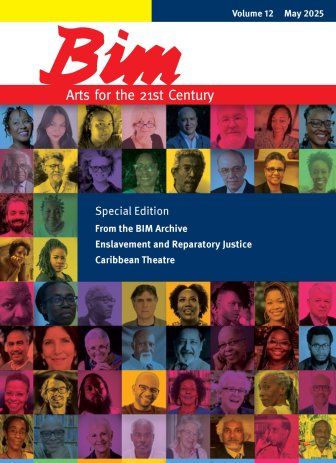Current Issue
A Reminiscence from the Archives:
Vol. 10, No. 38, Pages 68–72 (January–June 1964)
A Public Address from the Archives:
Vol. 14, No. 55, Pages 121–124, (July–December 1972)
Address at the Graduation Ceremony at the Cave Hill Campus, the University of the West Indies, Barbados, on 1st February, 1972
(In memory of Yarico, a young
Amerindian woman sold by her white lover,
Inkle, to a slave owner in Barbados)
Under a cold half-moon
you cross the road to gaze again
at your reflection in the nearby pond
“Where is my body?
December 2024
It is an honor to contribute to Bim: Arts for the 21st Century, a journal deeply rooted in the Caribbean, where the legacies of enslavement continue to shape our collective consciousness.
My sweet boy
As you grow
Floating in your mother’s
Swelling Sea-belly
As my soul swells
With this new feeling
Blossoming in my heart
Like the July-tree
Humming into red twilight
Do you lie alone?
Also in your empty bed,
That stretches to the hovering horizon?
Do you lie alone?
Also under that hollow roof
That catches the silent singing
Of the melancholy stars?
And, outside your window,
On our mighty chariot
The dancing Balaou
We set out merrily
A motley crew
For in the Caribbean
We need to keep
Protected our kin
Of that wondrous deep
So we looked for the thrones
The latest UN Climate Change Conference held in Baku (COP29) resulted in an agreement to commit US$300 billion per year in “climate finance” from developed to developing nations by 2035.
Dearly beloved, we are all gathered here today to witness the sad passing of our beloved matriarch, the late, Great, Salt Pond. She has nourished and cherished us along the banks of her salty waters for as long as there have been people living on this silted shore.
Translated from the Spanish by Thomas Rothe
In Carolina
before the housing developments
when the river would drown people
in a breeze
Translated from the Spanish by Thomas Rothe
From the country
to a slum in Río Piedras
to Comerío, Naranjito, San Juan, Cuba
New York, Washington, New York
and as a corpse back to Puerto Rico
two months after collapsing
A Conference Report from the Archives:
Vol. 12, No. 46, Pages 80–83 (January–June 1968)
A Poem from the Archives:
Vol. 12, No. 46, Pages 103–-4 (January–June 1968)
Two Cartoons with Captions
(1)
Four years ago
In this knot of a village outside the university
She was in residence.
take for instance—
three days ago
“before-day mawnin”
it was as though
your presence
pass through
between where
i was sitting
on the verandah
thinking it was you
i looked around
Market was empty today
More sellers than buyers
This year drought meant
No rain for months until
Sudden heavy showers
I spent all day talking
On my phone to a machine
I was on the receiving end
Countless voice message recordings
(Reconnecting Caribbean Links)
On a walkabout,
Through New Kingston,
From Caribbean Avenue
Along Antigua Avenue, Knutsford Boulevard,
To Barbados Avenue, Dominica Drive, Grenada Cresent,
Her hands in the suds,
washing dirty dishes,
as his tiny fingers tug
at the dressed-up frame—
resurrecting
her thoughts of his cooing
in a secondhand blankie.
Now, at his toddler-aged joy from

